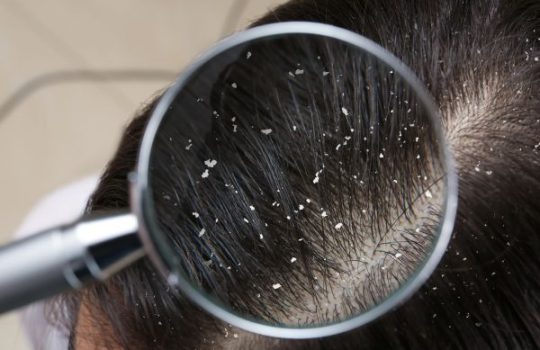The 6 most common scalp diseases
Today we're going to tackle a topic that may seem a little intimidating: scalp diseases. You may be wondering, “What is this? How does this happen? How can I treat it?” Well, don't worry, we're here to enlighten you.
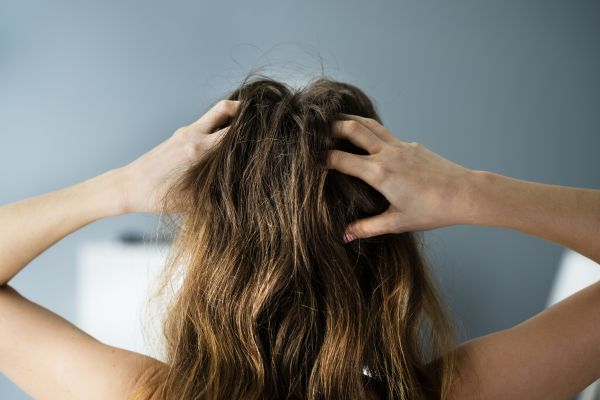
The causes of inflammatory scalp diseases
Just like our skin, the scalp is constantly exposed to a multitude of factors, whether environmental, related to our hair care or even our own physiology. Sometimes these elements can cause inflammation which, in turn, can trigger a series of problems. The specific causes of inflammatory scalp diseases can be diverse. For example, an allergic reaction to a hair product can trigger inflammation. Furthermore, existing medical conditions such as psoriasis or seborrheic dermatitis can also be the cause.
Sometimes, the natural aging of our skin can also lead to inflammatory problems. Several everyday factors can contribute to the appearance of these conditions: excessive sweating can create an environment conducive to the proliferation of bacteria and fungi, which can in turn cause inflammation. Stress, by disrupting the immune system, can also make the scalp more vulnerable to various conditions. Finally, a poor lifestyle, including an unbalanced diet or a lack of sleep, can weaken the overall health of the skin and therefore that of the scalp.
1) Seborrheic dermatitis
Seborrheic dermatitis is a relatively common skin condition that manifests itself as oily scales and red areas on the scalp. Although not dangerous, seborrheic dermatitis can be bothersome and uncomfortable for those who suffer from it. It is not just a cosmetic problem, symptoms can include itching and burning, which can become more severe if the condition is left untreated.
The exact cause of seborrheic dermatitis is not entirely known, but it is often associated with an overgrowth of a type of yeast, Malassezia, which lives naturally on the skin. When this yeast grows excessively, it can lead to inflammation and peeling of the skin. So, when should you consult a dermatologist? If symptoms persist despite the use of anti-dandruff shampoos or if the discomfort becomes too severe, it is best to consult a healthcare professional.
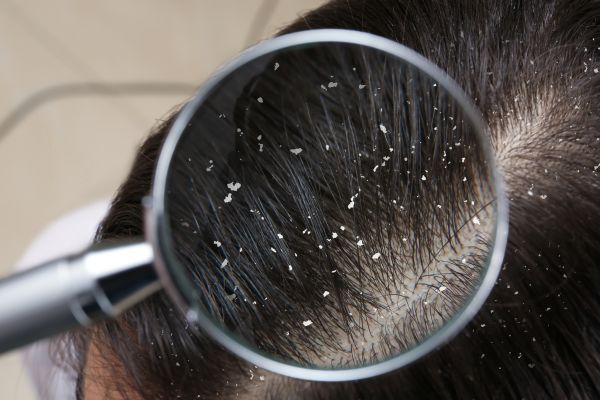
2) Psoriasis
Psoriasis is a chronic autoimmune disease that affects approximately 2 to 3% of the population in France. Although it can appear anywhere on the body, the scalp is one of the most commonly affected places. Characterized by red patches covered with white or silvery scales, scalp psoriasis can cause significant itching and discomfort. Psoriasis is the result of too rapid turnover of cells which accumulate on the surface of the skin and form plaques.
Although the exact causes of this acceleration are unknown, it is probably linked to a reaction of the immune system. It is recommended to consult a dermatologist if you suspect you have psoriasis. Although there is no definitive cure for this condition, several treatments can help control symptoms.
3) Ringworm
Ringworm, also known as tinea capitis, is a fungal infection of the scalp that is more common in children, although it can affect people of all ages. This infection is caused by a group of fungi called dermatophytes, which feed on the keratin found in hair, skin and nails. Ringworm symptoms can vary, but are generally characterized by hair loss, dandruff-like scales, and patches covered with small black dots.
In some cases, ringworm can also cause serious inflammation, called kerion, which can lead to scarring and permanent hair loss. Ringworm is highly contagious and is spread by direct contact with an infected person or by sharing personal items such as combs, hairbrushes and helmets. It is strongly recommended to consult a dermatologist if you suspect a ringworm infection.

4) Alopecia
Alopecia, or hair loss, is a common condition that affects millions of people in France. It can occur at any age and can be caused by a variety of factors, from stress to underlying medical conditions. Alopecia can manifest itself in different ways. In some cases, it can cause diffuse hair loss, while in others, it can cause loss of all hair on the scalp or the entire body.
Androgenetic alopecia, often called male or female pattern baldness, is the most common type of alopecia. It is usually caused by a mixture of genetic and hormonal factors. Other forms of alopecia, such as alopecia areata, are the result of the immune system attacking the hair follicles.
Learn more about alopecia in our article “Hair loss: when to worry?” >
5) Decalving folliculitis
Folliculitis decalvans is a rare but severe condition that affects the scalp. This is a type of folliculitis, an inflammation of the hair follicles, which leads to scarring, that is, irreversible hair loss. This condition usually manifests as patchy hair loss with inflamed hairs, often accompanied by pain, itching, and pus. The affected areas may gradually expand, leading to permanent hair loss. The exact cause of folliculitis decalvans is not known, but it may be related to an abnormal inflammatory response in the body. Some research suggests that a common skin bacteria, Staphylococcus aureus, may play a role in the development of this condition.
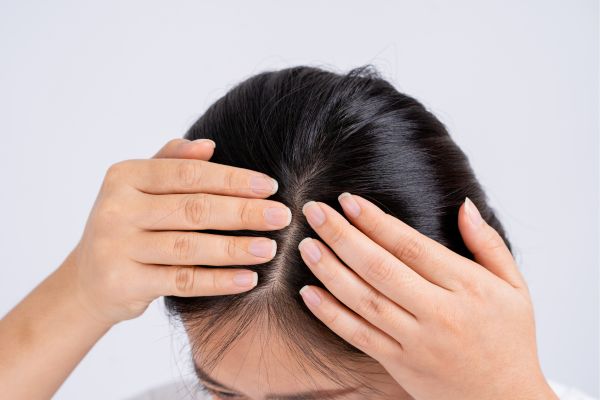
6) Discoid lupus erythematosus
Discoid lupus erythematosus (SLE) is a form of lupus that primarily affects the skin, including the scalp. It is an autoimmune disease, meaning the immune system attacks its own cells by mistake. On the scalp, SLE usually appears as round, thick patches, often accompanied by hair loss. These patches may be reddish, scaly, and may sometimes be itchy or painful. If left untreated, they can leave permanent scarring and irreversible hair loss may occur.
The cause of SLE is not entirely known, but is likely related to a combination of genetic and environmental factors. It is also more common in women than men.
Symptoms of an unbalanced scalp
Now that we know the types of inflammatory scalp diseases, let's talk about the symptoms. These illnesses can present with a variety of symptoms, but some of the most common include:
- Itchy scalp
- Redness
- Peeling
- Dandruff
- Hair loss
- Increased sensitivity
- Pain in the scalp
These symptoms may vary depending on the disease and its severity. If you experience any of these symptoms, it is important to consult a healthcare professional for proper diagnosis and treatment.
How to diagnose scalp diseases?
Diagnosis of inflammatory scalp diseases is generally made by observation of symptoms and physical examination of the scalp. A dermatologist can inspect the scalp to check for rashes, redness, dandruff, or other signs of inflammation. In some cases, it may be necessary to perform a skin biopsy to confirm the diagnosis.
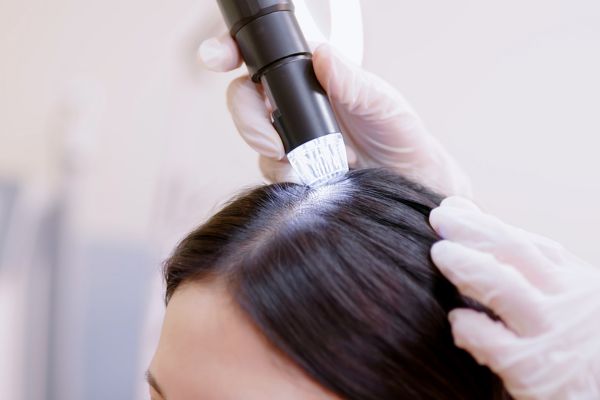
Treatments for scalp diseases
Treatment for inflammatory scalp diseases usually depends on the underlying cause of the inflammation. This may include topical medications to reduce inflammation and irritation, medicated shampoos to treat conditions such as seborrheic dermatitis or psoriasis, or antibiotics to treat scalp infections. In some cases, more intensive treatments may be necessary, such as oral corticosteroids or immunosuppressive medications.
Prevent scalp diseases
Prevention of inflammatory scalp diseases can be achieved by maintaining good scalp hygiene. This includes washing your hair regularly to remove buildup of oil and dead skin cells, avoiding irritating hair products, and maintaining a healthy diet to support skin health. It is also recommended to consult a dermatologist if you notice any unusual changes in your scalp, such as redness, itching, or persistent rashes.



